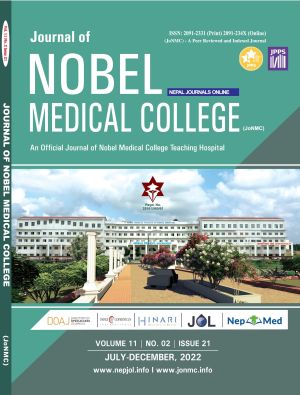Latent Tuberculosis Infection in Potential Renal Transplant Recipients and Live Donors in a Tertiary Level Transplant Center in Nepal
DOI:
https://doi.org/10.3126/jonmc.v11i2.50452Keywords:
Kidney Transplantation, Latent infection, Mycobacterium TuberculosisAbstract
Background: Active tuberculosis in transplant recipients can result from latent infection with Mycobacterium Tuberculosis in the transplant recipients, donor tissue, or de novo post-transplant infection. This study aimed to determine the prevalence of latent tuberculosis infection in potential renal transplant recipients and live donors at a tertiary-level transplant center.
Materials and Methods: This observational study was conducted from July to October 2020 among 72 potential kidney transplant recipients and their potential donors from the Department of Nephrology, Tribhuvan University Teaching Hospital. The biochemical parameters and health behaviors were measured to find the association with latent tuberculosis infection.
Results: The prevalence of latent tuberculosis infection according to Mycobacterium tuberculosis-specific interferon-gamma release assays was 20.8% in potential recipients and 16.6% in potential donors, whereas the prevalence with tuberculin skin test was 9.7% in potential recipients and 33.3% in potential donors. Low levels of hemoglobin, calcium, albumin, vitamin D and history of smoking were associated with the development of latent tuberculosis infection among potential recipients. Alcohol drinking was significantly associated with the development of latent tuberculosis infection among donors.
Conclusion: Potential renal transplant recipients and donors have a significant burden of latent tuberculosis in the pre-transplantation phase. Diagnosis and treatment of latent tuberculosis before transplantation can prevent ominous complications.
Downloads
Downloads
Published
How to Cite
Issue
Section
License

This work is licensed under a Creative Commons Attribution 4.0 International License.
JoNMC applies the Creative Commons Attribution (CC BY) license to works we publish. Under this license, authors retain ownership of the copyright for their content, but they allow anyone to download, reuse, reprint, modify, distribute and/or copy the content as long as the original authors and source are cited.




